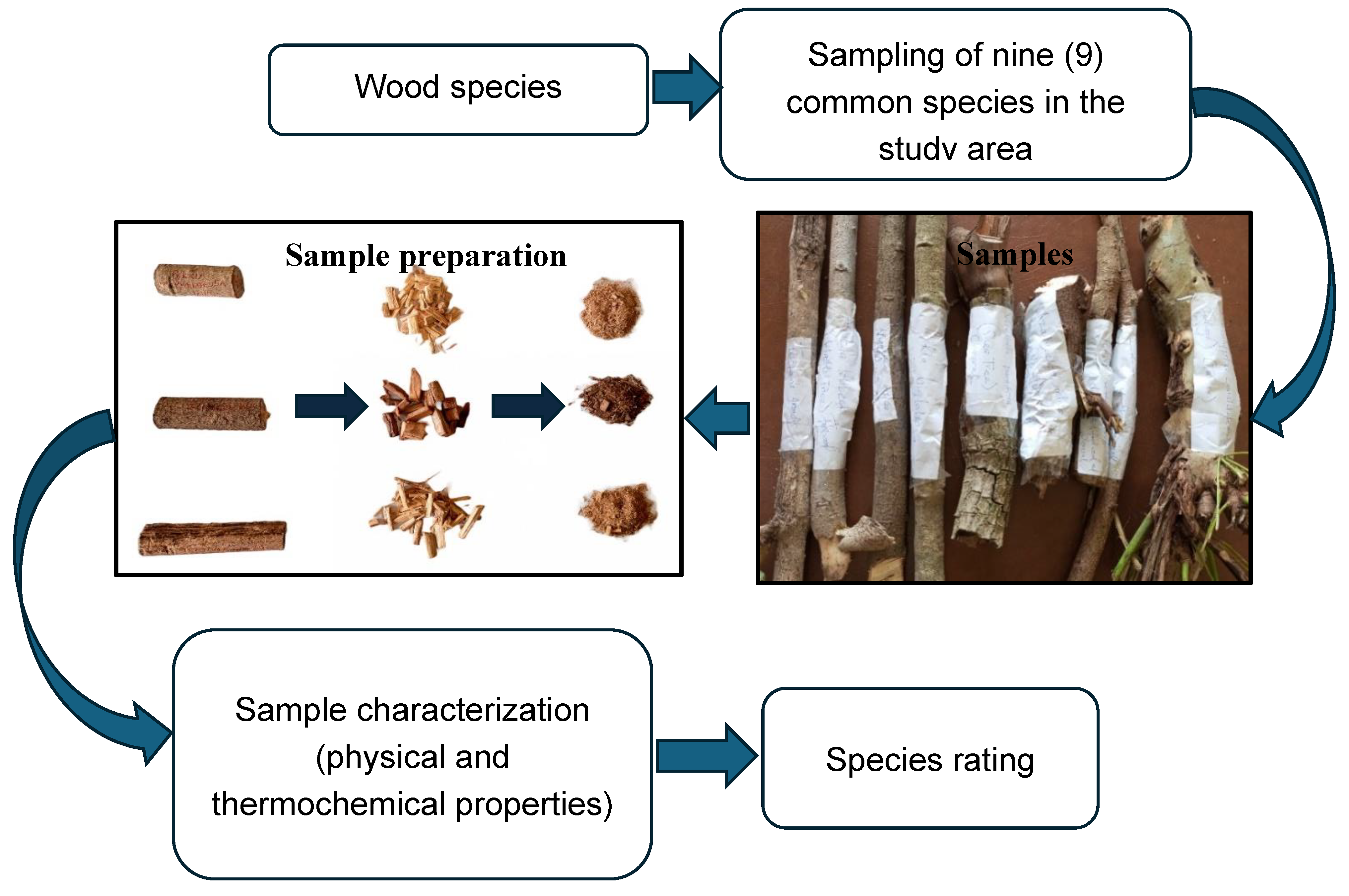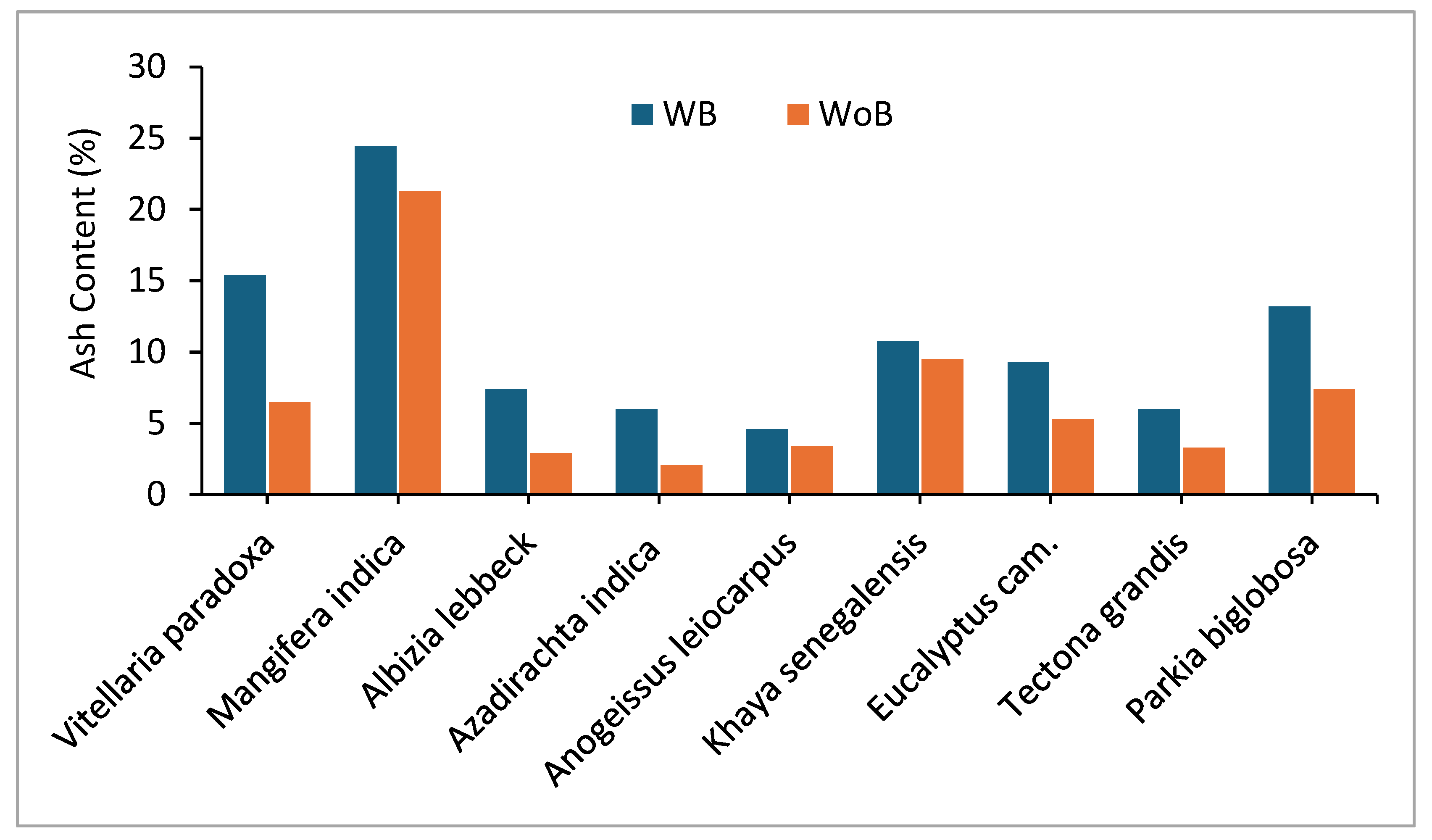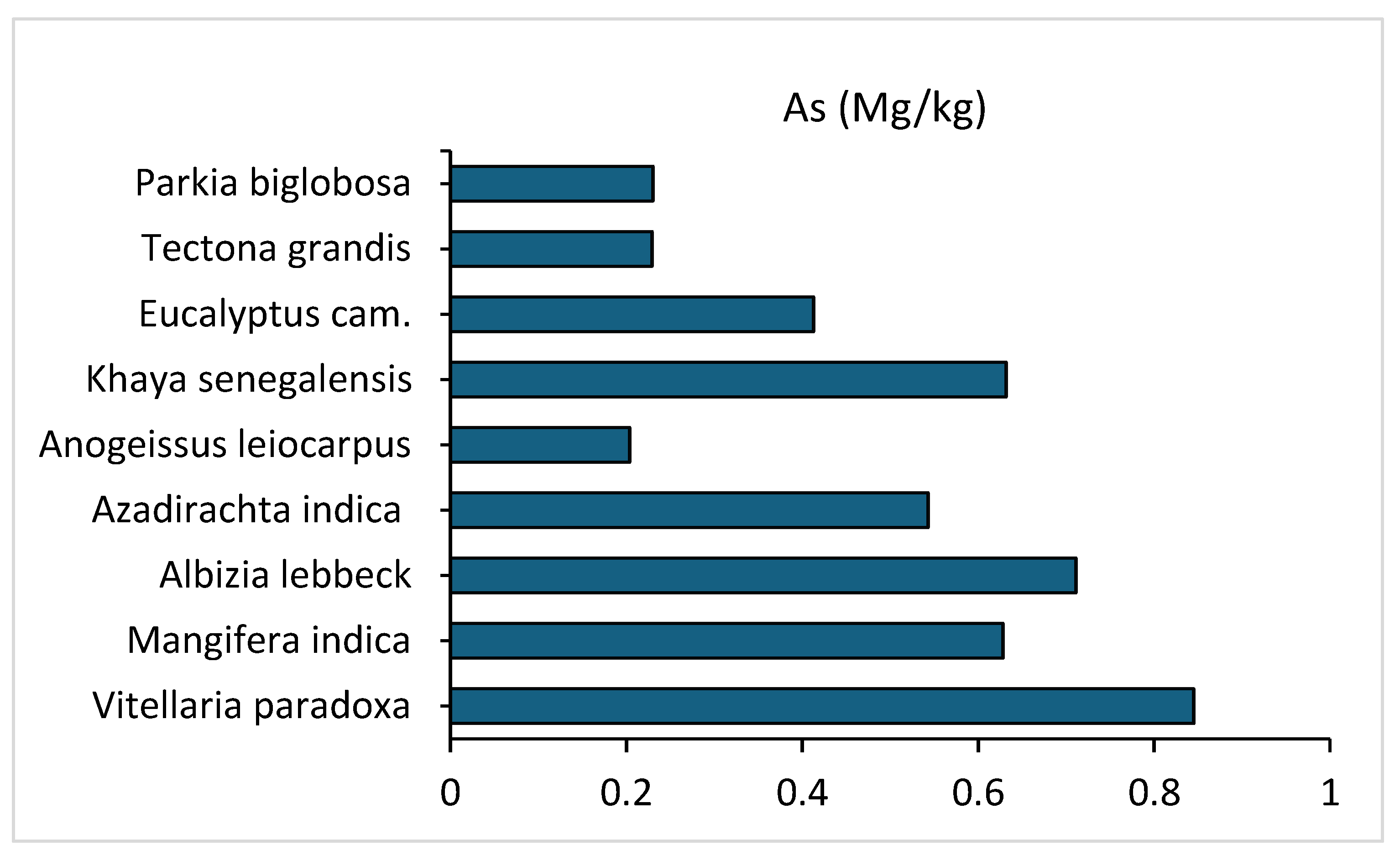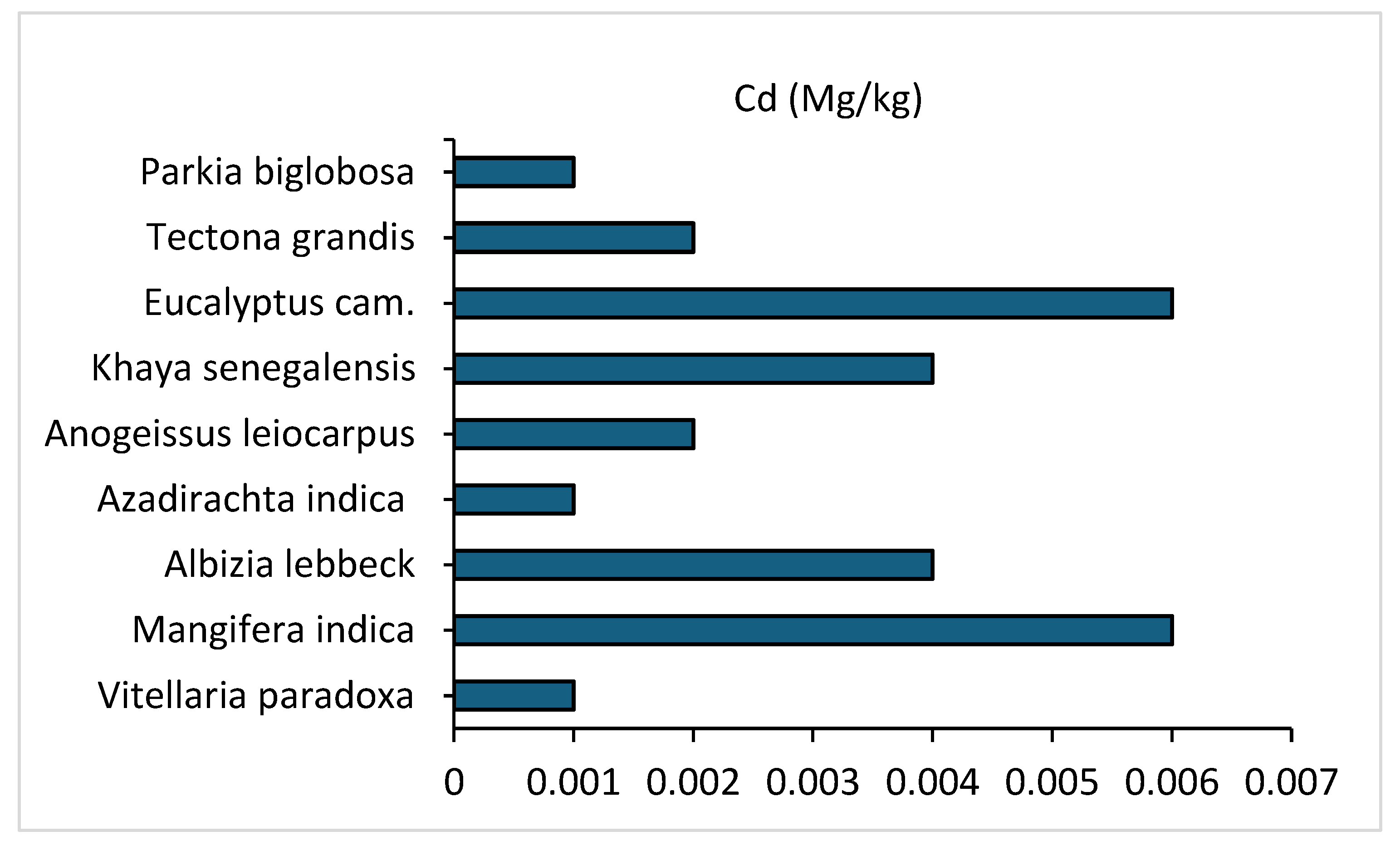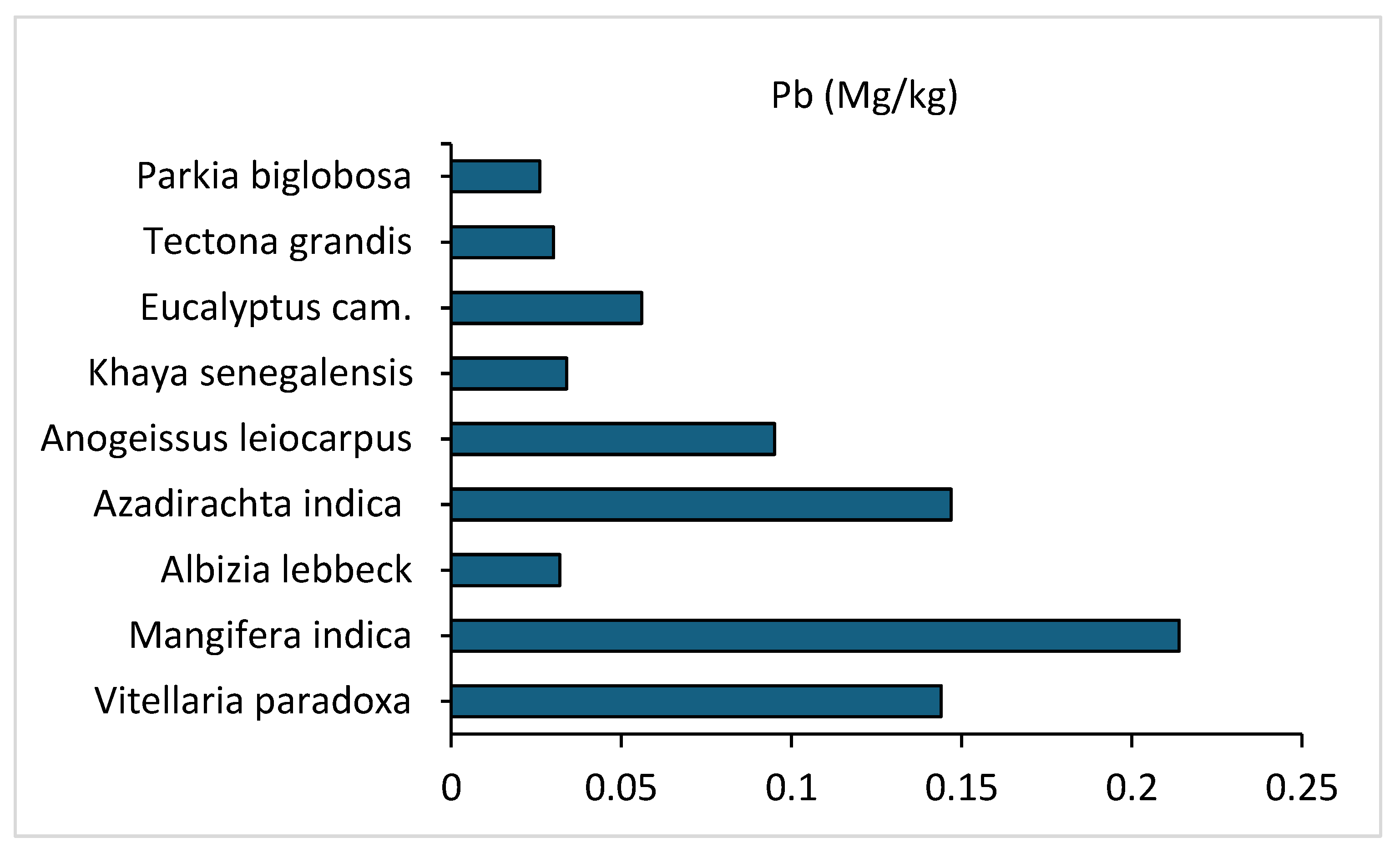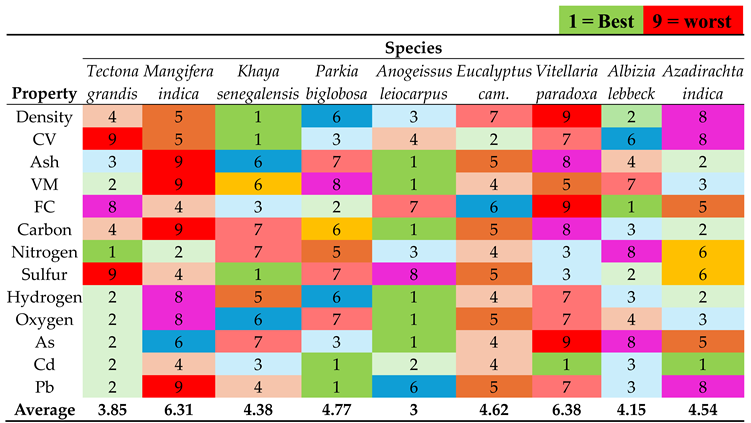1. Introduction
Woody biomass is one of the most used forms of biomass globally. Their use as fuel is increasing rapidly across the globe. About one-third of the world population equivalent to 2.6 billion people rely primarily on fuelwood to meet their energy needs [
1]. This is more predominant in Africa where over 80% of the population relies on different forms of wood to meet their energy needs [
2]. Based on this, the rate of deforestation and climate change has increased in recent years. In Africa, about 3.4 million hectares of forest land is lost per year [
3]. Nigeria is among the top ten countries globally with the highest rate of forest loss, as 5.0 % (410,000 hectares) of forest land is lost per annum [
4]. This figure may be exacerbated further as Nigeria is also the second-highest charcoal-producing nation in the world with an annual average production capacity of 4,828,689.00 tonnes as of 2022 [
5]. Similarly, the country’s major consumer of wood is the fuelwood sector which as of 2015 accounts for almost 87% of the total wood extracted [
4]. More worrisome is the fact that the production process is devoid of sustainable mechanisms such as constant tree planting to account for the deforested ones. Apart from the environmental impacts recorded through deforestation in Nigeria, the GDP accrued from forest ecosystem services which was valued at about one million Naira per hectare in 2015 (1,000,000/ha) has drastically reduced due to deforestation [
6]. To minimize the rate of deforestation in Nigeria, [
6] has recommended the formulation of policies involving tree planting through agroforestry, carbon trading, and the payment of incentives for forest management.
For solutions involving the production and use of alternative energy to curtail the unsustainable use of forests for fuel, several studies have worked enormously in various aspects. Some of these include the processing of lignocellulosic biomass into fuels such as briquettes [
7,
8], pellets [
9], and biogas [
10] among others. The appropriate use of fuel especially at low moisture content in improved cookstoves is another approach that can considerably reduce the gaseous emissions encountered from incomplete combustion. In this vein, studies including [
11,
12] have developed improved biomass cookstoves to reduce fuel use and gaseous emission. This has been proven as an effective approach to reduce the use of fuelwood and charcoal, with the potential of improved performance if the cookstoves are powered by pellets made from non-woody biomass [
13]. Despite the numerous advances, charcoal, and fuelwood production and use keep exacerbating. The use of polluting fuels including fuelwood and charcoal was projected to continue with more than one (1) billion people in Sub-Saharan Africa by 2025 [
14]. Thus, it becomes imperative to explore measures involving policy regulations that will improve sustainability in the use of wood. These may include limiting charcoal and fuelwood production to certain wood species or more importantly pelletizing the wood shavings and the residues into a more compact and durable form. To succeed in the aforementioned steps, it is pertinent to study the properties of the wood species conventionally used as fuelwood and charcoal to recommend the most efficient and cleaner option.
A couple of studies conducted on the characterization of selected wood species in Africa are presented in
Table 1. This ranges from the study of [
15] in Nigeria where species predominantly found in the South-Western part of Nigeria were characterized. Others include the study of [
16] in Uganda, [
17] in Senegal, [
18] in Botswana, and [
19] in Ghana among others. Most of the analyzed properties (calorific value, ash content, Nitrogen, and Sulfur content) of the wood species conform with the International Organization for Standardization ISO 17225-2, European Norm (ENplus) as set by the European Pellet Council, the German Institute for Standardization (DIN 51731/ DINplus) and the Austrian standard (ÖNORM M7135) for wood pellets. Although some of the reported studies did not consider toxic gases such as N and S,
Afr. Mesquite, one of the species studied by [
20] in South Africa was found to have its properties within the acceptable limits of ENplus, DIN 51731/ DINplus, ÖNORM M7135, and ISO 17225-2. However, in the same study,
Jacaranda species, despite having good calorific value, and acceptable Nitrogen (N) and sulfur (S) levels, the ash content was found to be above the required limits. A similar scenario was observed in the study of [
15] for
M. excelsa species, where a high calorific value was recorded but with ash content above the acceptable limit. This suggests that when selecting fuel woods by species, calorific value alone is not sufficient to determine the best species [
19].
Although several studies have been carried out on wood characterization, there is no adequate explanation of how specie types affect charcoal or fuelwood production, performance, and sustainability. The knowledge of this is imperative as users of charcoal and fuelwood are increasing rapidly. Thus, the findings in this study would serve as a guide in wood selection as it reports the most efficient and those with the best potential to be pelleted to augment the rapid deterioration of forests for fuelwood and charcoal production. Similarly, analyzing the wood’s proximate parameters with and without bark is an aspect that validates the influence of wood bark during combustion. This is equally missing in previous studies. Another novelty of this study is that it assessed the conformity of selected wood species from other African countries and those of this study with international wood pellet standards. Thus, the objective of this study is to evaluate the selected physical and thermochemical properties of some wood species used in fuelwood and charcoal production in Nigeria to determine the best in terms of fuel-related properties, and the best in terms of compliance with ENplus, DIN 51731/ DINplus, ÖNORM M7135 and ISO 17225-2 standards.
2. Materials and Methods
2.1. Sample Collection and Preparation
About 20 species were broadly identified. However, only the nine (9) most commonly used species in fuelwood and charcoal production in Kaduna State Nigeria, were selected for this study. The samples were collected from the Savannah Forestry Research Institute of Nigeria, Zaria Kaduna State (latitude 11˚10′ N and longitude 7˚37′ E). Out of the nine (9) species collected, four (4) are mainly used in charcoal production, viz: Vitellaria paradoxa (shea), Mangifera indica (mango), Anogeissus leiocarpa (marke), Tectona grandis (Teak), four (4) for fuelwood, viz: Eucalyptus spp (turare), Parkia biglobosa (dorawa), Albizia lebbeck, Azadirachfa indica (neem) and one (1) for both, viz: Khaya senegalensis (mahogany).
The samples were sundried for two days, shredded into smaller sizes, and heated for about 30 minutes at 105℃ in an oven to remove the core layer moisture. The dried samples were manually grounded with the aid of a mortar and pestle. The ground samples were further sieved through a 1 mm mesh size for characterization. The overall study flowchart is presented in
Figure 1.
2.2. Sample Characterization
The samples were characterized based on physical (moisture content, volume, and density) and thermochemical properties (calorific value, proximate, and ultimate parameters).
2.2.1. Physical Properties
Three parameters, viz: moisture content, volume, and density were determined. The moisture content was determined following the method described in [
25]. Because the samples are irregularly shaped samples, the volume and density were determined using the water displacement method. The weight of the samples was taken using a digital scale balance (Model: OPH-T3001) with an accuracy of 0.1g. The individual volume was obtained as the difference in volume after immersing each sample into a 500 ml volume of water in a transparent cylinder. Hence, the density was computed as the ratio of the mass and volume.
2.2.2. Thermochemical Properties
Gross Calorific Value (GHV) and Net Calorific Value (NHV)
The calorific value is the content of energy contained in the wood materials per unit mass (MJ/kg). Thus, the higher the calorific value the better the wood species when used as fuel. The gross calorific value was determined using a bomb calorimeter (Model: 6100, Parr Instrument Company, USA) following the method described in [
26]. The value indicates the energy content of the samples per unit mass (cal/g) [
27]. Thus, the higher the value, the better the thermal performance of the wood species.
The net calorific value was estimated from the gross calorific value (GHV) using Equation 1, as given by [
28]
where MC is the moisture content of the wood sample on a wet basis (decimal), H is the hydrogen concentration, percent by weight dry basis, and
is the latent energy of vaporization of water (MJ/kg) (2.26MJ/kg).
Proximate Analysis
Proximate analysis was performed to determine the content of volatile matter, ash content, and fixed carbon contained in the wood samples. Unlike the physical analysis, the proximate analysis was analyzed with bark (WB) and without bark (WoB). This is to figure out the differences between wood samples in terms of ash content and volatile matter with and without bark.
Volatile Matter
The sample’s volatile matter was determined using the modified procedure described in [
29] for all sparking fuels. 1g of each sample was weighed into a crucible, covered with a lid, and gradually heated to 650 ℃ for six minutes in a furnace (BIOB Muffle furnace). After which they were heated further at 930 ℃ for another six minutes. The percentage of volatile matter in each sample was determined with Equation 2 [
19].
where A is the weight of the oven-dried sample and B is the weight of the sample after heating in the furnace
Ash Content
The ash content was estimated by heating 1g of the sample in a furnace (BIOB Muffle furnace) for four hours, starting at room temperature to 500 ℃ in the first hour, and heating to 700 ℃ in the second hour. After the first two hours, the sample was heated continuously at 700 ℃ for an additional two hours as per [
30]. The percentage ash content was determined using Equation 3 [
19].
where
is the mass of the ash and
is the mass of the oven-dried sample.
Fixed Carbon
The fixed carbon (FC) was estimated by subtracting the value of the volatile matter (VM) and ash content from 100% as given in Equation 4 [
31]
Ultimate Analysis
The ultimate analysis was restricted to carbon, nitrogen, sulfur, hydrogen, oxygen, and three heavy metals (cadmium, lead, and arsenic). The nitrogen content was determined using the Micro-Kjeldahl method, the sulfur content was determined using the aluminum block method, and the heavy metals were determined through the perchloric acid digestion method. However, the content of carbon, hydrogen, and oxygen were estimated from the result of proximate analysis with an accuracy of ±2% using Equations 5, 6, and 7 [
32].
where, FC = Fixed Carbon, AC = Ash Matter, and VM = Volatile Matter
2.3. Rating of the Properties of the Wood Species
To determine the most suitable species and vice versa, the samples were rated between 1 to 9, with 1 indicating the best and 9 being the worst. The method employed in the rating was based on the average scores of each tested property [
19].
3. Results and Discussion
3.1. Physical Properties
The results of physical properties are presented in
Table 2. The moisture content of the samples ranges between 4.08% and 7%. This indicates that the samples were properly dried and within the optimum range of moisture required for wood pellets as set by ENplus, DIN 51731/DINplus, ÖNORM M7135, and ISO 17225-2. Having moisture levels above these limits may result in high char reactivity which induces the content of ash and toxic emission during combustion.
The density ranges between 398.00 kg/m
3 for
Vitellaria Paradoxa to 977.50 kg/m
3 for
Khaya Senegalensis. Although the obtained values are below the DIN 51731/DINplus and ÖNORM M7135 standards for wood pellets, all the samples except
Vitellaria Paradoxa conform with the density requirements of wood pellets for ENplus and ISO 17225-2. The variation in density by species shows that they will react differently during combustion. This is because density significantly influences the gasification process of fuels [
33]. Similarly, the sample densities are consistent with the findings of [
21] (553 kg/m
3 to 914 kg/m
3) for selected wood species in Ethiopia and higher than the findings (409.22 kg/m
3 to 764.11 kg/m
3) of [
19] for selected wood species in Ghana. However, the densities of these species are below the density (1250.0 ± 26.2 kg/m
2) of
grenadilla, a wood species common in the tropical part of Africa [
34].
3.2. Thermochemical Properties
3.2.1. Calorific Value
Table 3 shows the result of the calorific value of the samples. The gross calorific value of the samples is between 10.92 MJ/kg for
Tectona grandis and 18.85 MJ/kg for
Khaya senegalensis. While the net calorific value is between 10.61 MJ/kg for
Tectona Grandis and 18.44 MJ/kg for
Eucalyptus cam. The net calorific values recorded in
Khaya senegalensis, Parkia biglobosa, Anogeissus leiocarpus, and
Eucalyptus cam. are in agreement with ENplus and ISO 17225-2 standards. Similarly, the aforementioned samples, except
Anogeissus leiocarpus also conform with DIN 51731/ DIN plus and ÖNORM M7135 requirements for wood pellets. Species with higher calorific values were observed to have higher fixed carbon. Thus, the fixed carbon content of biomass directly influences the calorific value [
16]. The values obtained are consistent with the calorific values of some native wood species in Africa [
16,
17,
18]
. While moisture content significantly influences the energy content of fuels [
35], this fact is not consistent with all the samples in this study possibly due to the moisture loss during pretreatment.
3.2.2. Proximate Analysis
The results of the proximate analysis are presented in
Table 4. The ash content, volatile matter, and fixed carbon range between 4.6% - 24.4%, 65.94% - 87.77%, and 3.51% - 13.25% for samples analyzed with bark and 2.1% -21.3%, 73.98% - 85.99%, and 4.72% - 18.63% for samples analyzed without bark.
The ash content was observed to vary with the presence of wood bark as samples without bark depict lower ash levels compared with those with bark (
Figure 2). This shows that irrespective of the wood species, ash content increases with an increase in the quantity of bark. Moreover, because the content of ash depicts the slagging nature of the wood during combustion, the lower the ash content, the better the heating value [
36]. Overall, an ash content of less than 4% is generally preferred as it reduces slagging potential [
37]. However, when the woods have been carbonized into charcoal, an ash content of up to 8% is acceptable [
38]. Overall,
Azadirachta indica, Albizia lebbeck,
Tectona grandis, and Anogeissus leiocarpus, all without bark yielded the best ash contents of 2.1%, 2.9%, 3.3%, and 3.4% respectively.
However, in the case of volatile matter, all the species except
Mangifera Indica, Albizia lebbeck, and Parkia biglobosa depict higher values of volatile matter in samples with bark. Higher volatile matter shows the fuel ignitability and combustion potential [
16]. On the contrary, all samples without bark except
Mangifera indica and
Parkia biglobosa depict higher values of fixed carbon. Thus, since volatile matter is a measure of the quantity of fuel that combusts into gas when subjected to a temperature of 400°C to 500°C or more [
39], and fixed carbon is the remnant of combustible fuel after the volatile matter, moisture, and ash content have been removed [
40], it implies that fixed carbon is more essential in fuels. Thus, wood species without bark having presented higher fixed carbon values in most of the samples are perceived to be more efficient than samples with bark.
In terms of conformity with the ash content limit of the wood pellets standards, only Azadirachta indica (WoB) is at par with the ENplus B and ISO 17225-2 standards, as none of the samples meets ENplus A1 and A2, DIN 51731/DINplus, and Austria ÖNORM M7135 standards. With this, the use of blends and additives becomes imperative to reduce the ash contents.
Table 5 shows the results of the ultimate analysis. Here, major elemental constituents like carbon, oxygen, and hydrogen are higher in
Anogeissus leiocarpus (44.78%, 43.65%
, and 5.76%),
Azadirachta indica (44.29%, 42.76% and 5.69%),
Albizia lebbeck (44.21%, 41.55%, and 5.62%)
and Tectona grandis (43.92%, 43.03%, and 5.69%). This shows that the mentioned samples will have better combustion efficiency when used as fuel. On the other hand, minor constituents such as Nitrogen and Sulfur are measures depicting the extent of nitrogen and sulfuric-based emissions during combustion. Thus, the lower their percentages the cleaner the wood specie when combusted. Overall, the values of sulfur recorded (0.0031% – 0.0115%) in all the samples are in agreement with the ENplus, DIN 51731/DINplus, Austria ÖNORM M7135, and ISO 17225-2 standards. However, none of the samples meets the aforementioned standards in the case of nitrogen, where the contents are required to be ≤ 0.3 to ≤ 1.
Figure 3,
Figure 4 and
Figure 5 shows the result of heavy metals in the wood samples. Heavy metals in fuels significantly affect human health and the environment [
19]. Hence, the content must be considerably low and in conformity with the set limits to make the species safe for use as fuel.
Figure 3 shows the content of arsenic in the nine wood species. The values obtained are between 0.204 mg/kg for
Anogeissus leiocarpus and 0.845 mg/kg for
Vitellaria paradoxa. The values recorded meet the limit of ENplus and ISO 17225-2 (≤ 1 mg/kg).
Figure 4 shows the content of cadmium in the samples. The values recorded are between 0.001 mg/kg for
Parkia biglobosa, Azadirachta indica, and
Vitellaria paradoxa to 0.006 mg/kg for
Mangifera indica and
Eucalyptus cam. Overall, the content of Cd in all the samples conforms with the ENplus and ISO 17225-2 standards (≤ 0.5 mg/kg).
Figure 5 shows the content of lead obtained in the wood samples. The values obtained are between 0.026 mg/kg for
Parkia biglobosa and 0.214 mg/kg for
Mangifera indica. All the samples conform with the ENplus and ISO 17225-2 standards (≤ 10 mg/kg).
3.3. Rating of the Properties of the Wood Species
The rating of the evaluated fuel properties for the nine wood species is presented in
Table 6. The species were rated between 1 to 9, with 1 indicating the best and 9 being the worst. The overall rating was defined as the average rating of the properties of each wood species [
19]. Based on the result,
Anogeissus leiocarpus revealed the best fuel properties with an average rating score of 3, while
Vitellaria paradoxa on the other hand revealed the worst properties with an average rating score of 6.38.
However, in terms of conformity with the four wood pellets standards, Khaya senegalensis, Parkia biglobosa and Anogeissus leiocarpus having presented moisture content, density, calorific value, sulfur content, arsenic, cadmium, and lead within the set limits of ENplus, DIN 51731/DINplus, ÖNORM M7135 and ISO 17225-2 are therefore considered the best wood species.
3.4. Improving the Properties of Non-Suitable Wood Species
As discovered in previous sections, some wood species were found to be more suitable as fuel than others. Thus, this study is not oblivious to the fact that in certain environments the non-suitable species might be the only woods available or probably the more sustainable. In these cases, the use of additives, blends, and combinations of two or more species to augment the low properties is recommended. This is more typical if the wood residues or shavings are to be pelleted. Here, biomass residues such as groundnut shells, sawdust, or leaf litter waste may be used as blends to enhance the physical and thermal properties of the pellets [
41]. Similarly, bio-additives such as alkali lignin, glycerol, and L-proline can also be used [
42]. Chemical additives such as Adenylate kinase 2 (AK2) [
43], crude glycerin, and paraffin also showed good results in wood pellet production [
44]. Other additives reported in the literature include lignosulphonate, dolomite, starches, potato flour and peel, and some lubricating and vegetable oils [
45]. These additives have excellent thermal properties that when mixed with non-suitable biomass or wood species tend to reduce the ash fusion and improve the calorific values. However, a careful selection of the type of additive and the use of the appropriate biomass is imperative in attaining wood pellets with desired physical and thermal characteristics [
45]. For example, the addition of AK2 as an additive in pelleting barley and oat straw was observed to improve density and durability but increased the level of ash [
43].
In the case of combining or co-pelleting two or more species, it is equally important to check both properties carefully to ensure the resulting mixture yields an improved output. For example, a biomass with very low ash content may be mixed with another with high ash content to reduce the resulting ash content of the mixture [
41]. A 0.5% content of motor oil and vegetable oil was observed to have increased calorific value, while a 0.5% content of wheat starch as an additive significantly reduced ash formation by 200% [
45]. Similarly, the addition of 20 wt% sawdust or 20% groundnut shell reduces ash content between 8.6 % and 10.44 % [
41].
If the following recommendations as sourced from previous findings are applied, the properties of some unsuitable species could be improved and meet the designated standards
- (a)
Using 5% lignin and 10% proline additives was found to improve density significantly, reduce ash content (AC) by 0.04 %, and increase gross calorific value GHV by 0.2 MJ/kg [
46].
- (b)
The calorific values may be improved using lignin additives. Based on this, the original content of lignin in the species can be added to the percentage of additives to obtain the total lignin (L). Thus, the gross calorific value (GHV) can be determined from Equation 9 [
47].
Since the lignin content of the samples was not determined. Values from previous studies were considered. The lignin content of
Vitellaria paradoxa is about 35.7 ± 0.2 % [
48], 23.75% for
Magnifera indica [
49], 25.67% for
Albizia lebbeck [
50], 13.58% for
Azadirachta indica [
51], 35.4% for
Tectona grandis [
52]. Following this, the five (5) species with calorific values below the standard minimum can be improved by adding 5% content of lignin as an additive and recomputing the calorific value following Equation 9 (
Table 7).
Similarly, the ash contents and gaseous emissions of the samples would be drastically reduced if the wood barks were shaved out before pelleting or direct use as fuel. This is more peculiar to Albizia lebbeck (WoB) and Azadirachta indica (WoB) which recorded lower ash contents of 2.9 % and 2.1 %, respectively.
If the above assertions are followed, Tectona grandis, Albizia lebbeck, and Azadirachta indica having their calorific values improved to the standard limit and other parameters (density, sulfur, arsenic, cadmium, and lead) within the limit of ENplus, DIN 51731/DINplus, ÖNORM M7135 and ISO 17225-2 would equally be suitable for use as fuel.
3.5. Research Limitations, Practical Implications, and Future Perspectives
While the study has assessed the suitability of the wood species as fuel based on their physical and thermochemical properties, this paper has not practically assessed the use of blends and additives to determine the improvement in ash content and calorific values. Thus, only a theoretical approach was used to predict the improvement. In this vein, future research could evaluate the effect of various blends and additives on species particularly found unsuitable in this study to track the improvement and compare the outputs with the theoretical method as a way of validation. Although the samples were pretreated before characterization, there was no measure employed in this study to eliminate contaminants embedded in the samples. This might have influenced the output of the experiments, especially the ash and Nitrogen content. Future research could include the removal of toxic contaminants to simulate the actual properties of the species.
4. Conclusions
Selected physical and thermochemical properties of nine wood species used in charcoal and fuelwood production in Nigeria were evaluated. This was to assess their suitability as fuel and their pelleting potential based on four wood pellet standards. To determine the influence of wood bark on thermal performance. The proximate analysis was carried out on the samples with bark and without bark to assess their variation in combustion parameters. Overall, it can be inferred from the study that wood species without bark presented lower ash content and higher fixed carbon values. Thus, they have better thermal performance compared with samples with bark.
In terms of suitability as fuel based on the physical and thermal properties, the findings showed Anogeissus leiocarpus to contain the best fuel properties. However, in terms of conformity with the four wood pellets standards, Khaya senegalensis, Parkia biglobosa, and Anogeissus leiocarpus having presented moisture content, density, calorific value, sulfur content, arsenic, cadmium, and lead within the set limits of ENplus, DIN 51731/DINplus, ÖNORM M7135 and ISO 17225-2 are therefore considered the best wood species with the highest pelleting potential. Thus, this finding further revealed that not all wood species are suitable as fuel. Therefore, it is important to set policies that would curtail the indiscriminate cutting of trees for fuel to help mitigate climate change and improve energy efficiency. However, in environments where the non-suitable species are the dominant or available woods, the use of biomass blends or additives could be employed to adapt the quality to the ISO commercialization standards. In the same context, the use of improved cookstoves is another measure to minimize fuel use and toxic gas emissions during combustion.
Author Contributions
Literature search, investigation, formal analysis, writing-original draft, S.U.Y.; conceptualization, supervision, writing-review and editing, S.N.; conceptualization, supervision, E.M.; supervision, K.P.; supervision, A.S. All authors have read and agreed to the published version of the manuscript.
Funding
This study was funded by the German Federal Ministry of Education and Research (BMBF) through the West African Science Service Centre on Climate Change and Adapted Land Use (WASCAL).
Data Availability Statement
The raw data supporting the conclusions of this article will be made available by the authors on request.
Acknowledgments
The Authors are grateful to the German Federal Ministry of Education and Research (BMBF) for funding the study through the West African Science Service Centre on Climate Change and Adapted Land Use (WASCAL), under the Graduate Research Programme on Climate Change & Land Use (CCLU), College of Engineering, Kwame Nkrumah University of Science and Technology, Kumasi, Ghana. We are also grateful to the Savannah Forestry Research Station Zaria, Kaduna State Nigeria for providing the samples. .
Conflicts of interest
The authors declare no conflict of interest.
References
- Schilmann, A.; Ruiz-García, V.; Serrano-Medrano, M. Just and fair household energy transition in rural Latin American households: Are we moving forward? Environ. Res. Lett. 2021, 16, 105012. [CrossRef]
- Boafo-mensah, G.; Darkwa, M.K.; Laryea, G. Effect of combustion chamber material on the performance of an improved biomass cookstove. Case Stud. Therm. Eng. 2020, 21. [CrossRef]
- Food and Agricultural Organization FAO. Available online: https://www.fao.org/3/i1757e/i1757e.pdf (accessed on 03 January 2023).
- Food and Agriculture Organization FAO. Available online: https://www.fao.org/3/i4793e/i4793e.pdf. (accessed on 08 January 2024).
- Food and Agricultural Organization FAO. Available online: https://www.fao.org/faostat/en/#home (accessed on 16 March 2024).
- United Nations Environment Programme. Available online: https://www.uncclearn.org/wp-content/uploads/library/final_report_summary_for_decision_makers_redd_nigeria_unep.pdf (accessed on 17 March 2024).
- Akogun, O.A.; Waheed, M.A.; Ismaila, S.O.; Dairo, O.U. Physical and Combustion Indices of Thermally Treated Cornhusk and Sawdust Briquettes for Heating Applications in Nigeria. J. Nat. Fibers 2022, 19, 1201–1216. [CrossRef]
- Yunusa, S.U.; Mensah, E.; Preko, K.; Narra, S.; Saleh, A.; Sanfo, S. A comprehensive review on the technical aspects of biomass briquetting. Biomass Convers. Biorefinery 2023. [CrossRef]
- Narra, S.; Dasgupta, S.; Ay, P.; Zheng, T.; Weller, N. Pelletisation of Rye- and Wheat straw with additives. In Proceedings of the 19th European Biomass Conference and Exhibition, Berlin, Germany, 6-10 June 2011.
- Pal, D.B.; Tiwari, A.K.; Mohammad, A.; et al. Enhanced biogas production potential analysis of rice straw: Biomass characterization, kinetics and anaerobic co-digestion investigations. Bioresour. Technol. 2022, 358, 127391. [CrossRef]
- Barbour, M.; Udesen, D.; Bentson, S.; et al. Development of wood-burning rocket cookstove with forced air-injection. Energy Sustain. Dev. 2021, 65, 12–24. [CrossRef]
- Yunusa, S.U.; Isiaka, M.; Saleh, A. Development of double burner natural-draft biomass cookstove. Agric. Eng. Int. CIGR J. 2022, 24, 194–206.
- Yunusa, S.U.; Mensah, E.; Preko, K.; et al. Biomass cookstoves: A review of technical aspects and recent advances. Energy Nexus 2023, , 100225. [CrossRef]
- Stoner, O.; Lewis, J.; Martínez, I.L.; Gumy, S.; Economou, T.; Adair-Rohani, H. Household cooking fuel estimates at global and country level for 1990 to 2030. Nat. Commun. 2021, 12. [CrossRef]
- Ogunsola, O.E.; Adeleke, O.; Aruna, A.T. Wood fuel analysis of some selected wood species within Ibadan. IOP Conf. Ser. Earth Environ. Sci. 2018, 173. [CrossRef]
- Lubwama, M.; Yiga, V.A.; Ssempijja, I.; Lubwama, H.N. Thermal and mechanical characteristics of local firewood species and resulting charcoal produced by slow pyrolysis. Biomass Convers. Biorefinery 2023, 13, 6689–6704. [CrossRef]
- Ndecky, A.; Tavares, P.W.; Senghor, A.; Kane, M.; Ndiath, H.; Youm, I. Proximate Analysis of Alternatives Cooking Solides Fuels in Sub Saharan by Using Astm Standards. Int. J. Clean Coal Energy 2022, 11, 1–12. [CrossRef]
- Charis, G.; Danha, G.; Muzenda, E. Characterizations of biomasses for subsequent thermochemical conversion: A comparative study of pine sawdust and acacia tortilis. Processes 2020, 8. [CrossRef]
- Mitchual, S.J.; Frimpong-mensah, K.; Darkwa, N.A. Evaluation of Fuel Properties of Six Tropical Hardwood Timber Species for Briquettes. J. Sustain. Bioenergy Syst. 2014, 4, 1–9. [CrossRef]
- Okoro, N. jnr M.; Ikegwu, U.M.; Harding, K.G.; Daramola, M.O. Evaluation of Fuel Quality of Invasive Alien Plants and Tropical Hardwoods as Potential Feedstock Materials for Pyro-Gasification. Waste and Biomass Valorization 2022, 13, 1293–1310. [CrossRef]
- Desta, H.M.; Ambaye, C.S. Determination of Energy Properties of Fuelwood from Five Selected Tree Species in Tropical Highlands of Southeast Ethiopia. J. Energy 2020, . [CrossRef]
- European Pellet Council (EPC). Quality Certification Scheme For Wood Pellets. Part 3: Pellet Quality Requirements. In The EN plus Handbook; European Pellet Council: 1050 Brussels, Belgium, 2015; pp. 1–10.
- Pellets Atlas. Available online: www.pelletsatlas.info (accessed on 18 October 2023).
- International Organization for Standardization ISO. Available online: https://www.iso.org/standard/76088.html (accessed on 19 March 2024).
- ASTM D3173-87. Standard Test Method for Moisture in the Analysis Sample of Coal and Coke. In The Annual Book of ASTM Standards, ASTM International: West Conshohocken, PA, US, 1996; pp. 315-316.
- ASTM D5865-10a. Standard Test Method for Gross Calorific Value of Coal and Coke. In The Annual Book of ASTM Standards, ASTM International: West Conshohocken, PA, US, 2010; pp.1-14.
- Musabbikhah; Saptoadi, H.; Subarmono; Wibisono, M.A. Analysis and Selection of the Best Model of Biomass Briquette Based on Calorific Value. J. Phys. Conf. Ser. 2019, 1175. [CrossRef]
- Ebeling, J.M.; Jenkins, B.M. Physical and Chemical Properties of Biomass Fuels. Trans. Am. Soc. Agric. Eng. 1985, 28, 898–902. [CrossRef]
- ASTM D3175-07. Standard Test Method for Volatile Matter in the Analysis Sample of Coal and Coke. In The Annual Book of ASTM Standards, ASTM International: West Conshohocken, PA, US, 2007.
- ASTM D3174-02. ASTM: Standard test method for ash in the analysis sample of coal and coke from coal. In The Annual Book of ASTM Standards, ASTM International: West Conshohocken, PA, US, 2002.
- Mansaray, K.G.; Ghaly, A.E. Physical and thermochemical properties of rice husk. Energy Sources 1997, 19, 989–1004. [CrossRef]
- TT, A.K.; Mech, N.; Ramesh, S.T.; Gandhimathi, R. Evaluation of composite briquettes from dry leaves in energy applications for agrarian communities in India. J. Clean. Prod. 2022, 350, 131312. [CrossRef]
- Sakthivadivel, D.; Iniyan, S. Characterization, density and size effects of fuels in an advanced micro-gasifier stove. Biofuels 2020, 11, 857–869. [CrossRef]
- Alkadri, A.; Jullien, D.; Arnould, O.; et al. Hygromechanical properties of grenadilla wood (Dalbergia melanoxylon). Wood Sci. Technol. 2020, 54, 1269–1297. [CrossRef]
- Mierzwa-Hersztek, M.; Gondek, K.; Jewiarz, M.; Dziedzic, K. Assessment of energy parameters of biomass and biochars, leachability of heavy metals and phytotoxicity of their ashes. J. Mater. Cycles Waste Manag. 2019, 21, 786–800. [CrossRef]
- Thabuot, M.; Pagketanang, T.; Panyacharoen, K.; Mongkut, P.; Wongwicha, P. Effect of Applied Pressure and Binder Proportion on the Fuel Properties of Holey Bio-Briquettes [Internet]. Elsevier B.V.
- Nagarajan, J.; Prakash, L. Preparation and characterization of biomass briquettes using sugarcane bagasse, corncob and rice husk. Mater. Today Proc. 2021, 47, 4194–4198. [CrossRef]
- European Committee for Standardization EN 1860-2. Appliances, solid fuels and firelighters for barbecueing,Part 2:Barbecue charcoal and barbecue charcoal briquettes. Requirements and test methods. 2005, .
- Sunnu, A.K.; Adu-Poku, K.A.; Ayetor, G.K. Production and Characterization of Charred Briquettes from Various Agricultural Waste. Combust. Sci. Technol. 2021, . [CrossRef]
- Sarkar, D. Fuels and Combustion. Thermal Power Plant, Elsevier: Radarweg 29, 1000 AE Amsterdam, Netherlands, 2015; pp. 91–137.
- Rajput, S.P.; Jadhav, S. V; Thorat, B.N. Methods to improve properties of fuel pellets obtained from different biomass sources: Effect of biomass blends and binders. Fuel Process. Technol. 2020, 199. [CrossRef]
- Azargohar, R.; Nanda, S.; Kang, K.; et al. Effects of bio-additives on the physicochemical properties and mechanical behavior of canola hull fuel pellets. Renew. Energy 2019, 132, 296–307. [CrossRef]
- Emami, S.; Tabil, L.G.; Adapa, P.; et al. Effect of fuel additives on agricultural straw pellet quality. Int. J. Agric. Biol. Eng. 2014, 7, 92–100.
- Xia, X.; Zhang, K.; Xiao, H.; Xiao, S.; Song, Z.; Yang, Z. Effects of additives and hydrothermal pretreatment on the pelleting process of rice straw : Energy consumption and pellets quality. Ind. Crop. Prod. 2019, 133, 178–184. [CrossRef]
- Tarasov, D.; Shahi, C.; Leitch, M. Effect of Additives on Wood Pellet Physical and Thermal Characteristics: A Review. ISRN For. 2013. [CrossRef]
- Abedi, A.; Cheng, H.; Dalai, A.K. Effects of Natural Additives on the Properties of Sawdust Fuel Pellets. Energy Fuels 2018, 32, 1863–1873. [CrossRef]
- Demirbaş, A. Relationships between lignin contents and heating values of biomass. Energy Convers. Manag. 2001, 42, 183–188. [CrossRef]
- Olabisi, A.S.; Balogun, A.O.; Oni, T.O.; et al. Physicochemical Characterization of Woody Lignocellulosic Biomass and Charcoal for Bio-energy Heat Generation. Sci. Rep. 2023, 13. [CrossRef]
- Sharma, A.; Mohanty, B. Thermal degradation of mango (Mangifera indica) wood sawdust in a nitrogen environment: characterization, kinetics, reaction mechanism, and thermodynamic analysis. RSC Adv. 2021, 11, 13396.
- Sultana, S.; Reja, Mohammad Mahbub Hilary, L.N.; Saiful Islam, M.; Zamsed Uddin, M.; Ajmotgir, W.M. Preparation and characterization of nanocellulose from Albizia lebbeck sawdust and their application in nanocomposites using poly (vinyl chloride) (PVC). Res. Sq. 2021.
- Manimaran, P.; Senthamaraikannan, P.; Sanjay, M.R.; Barile, C. Comparison of fibres properties of azadirachta indica and acacia arabica plant for lightweight composite applications. Struct. Integr. Life 2018, 18, 37–43.
- Lourenço, A.; Neiva, D.M.; Gominho, J.; Marques, A.V.; Pereira, H. Characterization of lignin in heartwood, sapwood and bark from Tectona grandis using Py–GC–MS/FID. Wood Sci. Technol. 2015, 49, 159–175.
|
Disclaimer/Publisher’s Note: The statements, opinions and data contained in all publications are solely those of the individual author(s) and contributor(s) and not of MDPI and/or the editor(s). MDPI and/or the editor(s) disclaim responsibility for any injury to people or property resulting from any ideas, methods, instructions or products referred to in the content. |
© 2024 by the authors. Licensee MDPI, Basel, Switzerland. This article is an open access article distributed under the terms and conditions of the Creative Commons Attribution (CC BY) license (http://creativecommons.org/licenses/by/4.0/).
